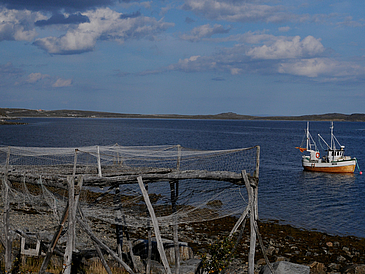Rising levels of carbon dioxide in the world’s oceans are causing their acid content to increase alarmingly. The acidity of seawater is growing at a pace never seen before – but the consequences for the economy and society are still relatively little researched. It is a given, though, that taken together with other stress factors the increase in acidity levels and water temperatures will bring about a dramatic change in marine ecosystems. Scientists at the University of Bremen working within the German research network BIOACID (Biological Impacts of Ocean ACIDification) are developing a computer model to encompass the ecological and socio-economic impacts of these changes. The model is based on interviews and workshops with veterans of the fishing and tourism industries, state agencies, and environmental organizations in Norway.
“A systematic view of what is happening will help us analyze the socio-economic consequences of changes to our oceans and climate in order to develop adaptation strategies”, explains Dr. Stefan Gößling-Reisemann, a member of the research team at the artec Research Center for Sustainability at the University of Bremen. “We bring together scientists and the persons affected by these changes in a mutual effort to identify the research issues that could be crucial for future society.” Norway was selected as the region to be investigated because it is expected that here the socio-economic consequences of the changing chemistry of the oceans will first be felt: the fishing industry and tourism are two of the country’s most important economic sectors.
Norwegian fishermen experience what is happening daily
Fishermen in Norway are already well aware of changes to the marine ecosystem. “The fact that many of these fishermen know about the changes taking place and their ecological implications left a great impression on us”, says Stefan Königstein, a marine biologist at the University of Bremen. They are confronted with the changing scenario on a daily basis. Stocks of cod and mackerel are less widespread. They are moving to new spawning grounds and today even species like sardines can be found in Norwegian waters. These shifts are likely to confront coastal fishermen with serious problems as their relatively small fishing vessels cannot follow the fish out to sea. In the high North of Norway more and more fish stocks are disappearing from the fjords, robbing the indigenous population of an important part of their livelihood and threatening the Sami culture. Tourism, too, is an important source of income generation in the North of the country. Until now the tourists are attracted by sport angling and whale observation, both of which will suffer from the changes taking place to the food chain.
The Bremen research team has put all this and many other facts into a report which is freely accessible on the European science platform ZENODO (https://zenodo.org/record/8317). Gößling-Reisemann and Königstein are currently busy working the various relevant factors into their computer model. “Research has a long way to go before we will be able to fully understand the effect of climate change on complex marine ecosystems. We have already learned a great deal, though, from talking with the people who are in daily contact with the sea.”
The BIOACID research project
Biological Impacts of Ocean Acidification II is a program of collaborative research. The task of coordination lies with the GEOMAR Helmholtz Center for Ocean Research in Kiel. Altogether, fourteen other research institutions and collaborations are taking part in the program. The Bremen participants are the Center for Marine Environmental Sciences (MARUM), the Alfred Wegener Institute Helmholtz Center for Polar and Marine Research (AWI), the University of Bremen, and the Max Planck Institute for Marine Microbiology. The aim of BIOACID II is to examine the chain of biological mechanisms – the reactions of organisms – their impact on food chains and ecosystems, and the associated socio-economic consequences in order to arrive at a better understanding of what is happening.
For further information, please contact:
www.bioacid.de

